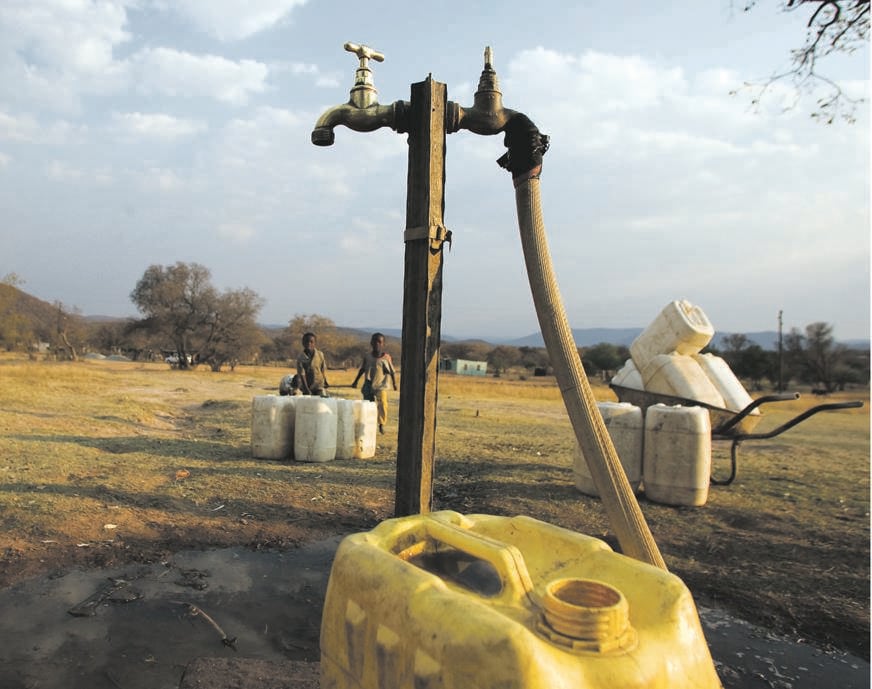
Our once-formidable services have been left to decay, denying many their human rights, write Barbara Schreiner and David Lewis
By Monday, at least 62 people in the country had been confirmed to have the Covid-19 coronavirus, which has gripped the world since its outbreak in China.
The best protection against the virus is frequent and thorough hand washing with soap.
But what does that mean for the millions of South Africans who do not have access to a regular supply of clean water or access to hygienic sanitation?
Think of the implications for those many people with compromised immune systems or medical conditions such as diabetes and heart problems.
Official statistics show that after massive improvements in the first 10 to 15 years after 1994, access to reliable water supplies is now decreasing across the country.
Rampant corruption and mismanagement have ripped through the sector, leaving taps dry and sewage spilling into streets and rivers.
The department of water and sanitation reported that in 2016 only 65% of households had access to reliable supply of water – in the poorest rural districts that figure was 37% – despite the billions of rands that have been spent on infrastructure over the past two decades.
This is a tragic irony in a country that once led the global water and sanitation community – we included access to water in our Bill of Rights, introduced free basic water so that even the indigent could access enough water, and achieved the 2015 Millennium Development Water Goal ahead of time.
At the UN’s World Summit on Sustainable Development in Johannesburg in 2002, we ensured that safe and dignified sanitation was put on the agenda for global action.
But now those good news stories are being replaced by tales of corruption and gross mismanagement.
Journalists and civil society have brought appalling stories into the spotlight, and in towns and villages across the country ordinary people will tell you how they routinely struggle to get water.
Read: ‘Why must I vote when I still queue for water?'
The Mail & Guardian recently reported how water technicians in Ugu, KwaZulu-Natal, carry guns while fixing water infrastructure to protect themselves from workers fired as a result of political infighting in the municipality.
In Giyani, Limpopo, despite billions of rands spent in response to a drought that hit the area in 2010, the community still does not have secure water supply.
The department alone is investigating around 800 cases of fraud, maladministration and corruption.
Such horror stories are legion and are documented in a joint report released this week by Corruption Watch and the international Water Integrity Network.
The report highlights the systemic looting of the sector and the links between political party funding and corruption.
The Special Investigating Unit, as far back as 2016, was tasked with investigating corruption in the sector, but many of those responsible for the worst cases are still walking free.
The result is the ongoing violation of the human right to water, a betrayal of our constitutional promise to the people of South Africa.
This year, the tenth year since the recognition of the human right to water by the UN, this is a particularly bitter pill.
For those who have worked tirelessly over years to keep the taps running and to provide decent sanitation facilities, it is hard not to despair, but we cannot afford the luxury of despair.
If we are to protect the health of our people and our economy, we have to get water working again.
In Harrismith, Free State, a motley group of people, the Water Heroes, are doing just this, having taken upon themselves the task of fixing the town’s water supply in the face of utter failure on the part of the municipality.
It is time that the rest of us, in civil society, the private sector, and those in government who are committed to cleaning out corruption, pull together to make the water sector an oasis of integrity.
We need to rid water of the virus of corruption, and that will have to be everybody’s business.
Working together, we must ensure that the corrupt are held accountable. One idea is to follow the model of the health sector, where a multistakeholder forum has been created to tackle corruption.
In many places, we will have to rebuild functional water organisations that can ensure that everyone has access to clean water and decent sanitation systems.
This will only be possible if leadership is capable, committed and, above all, ethical. Independent vetting of appointments to the boards of state-owned entities might be a good place to start.
The battle to clean up the water sector is not going to be easy, but South Africans have never balked at challenges.
This is one that we need to take on together and win.
Schreiner is executive director of the Water Integrity Network and Lewis is executive director of Corruption Watch
 | ||||||||||||||||||||||||||
Get in touchCity Press | ||||||||||||||||||||||||||
| ||||||||||||||||||||||||||
| Rise above the clutter | Choose your news | City Press in your inbox | ||||||||||||||||||||||||||
| City Press is an agenda-setting South African news brand that publishes across platforms. Its flagship print edition is distributed on a Sunday. |




 Publications
Publications
 Partners
Partners








